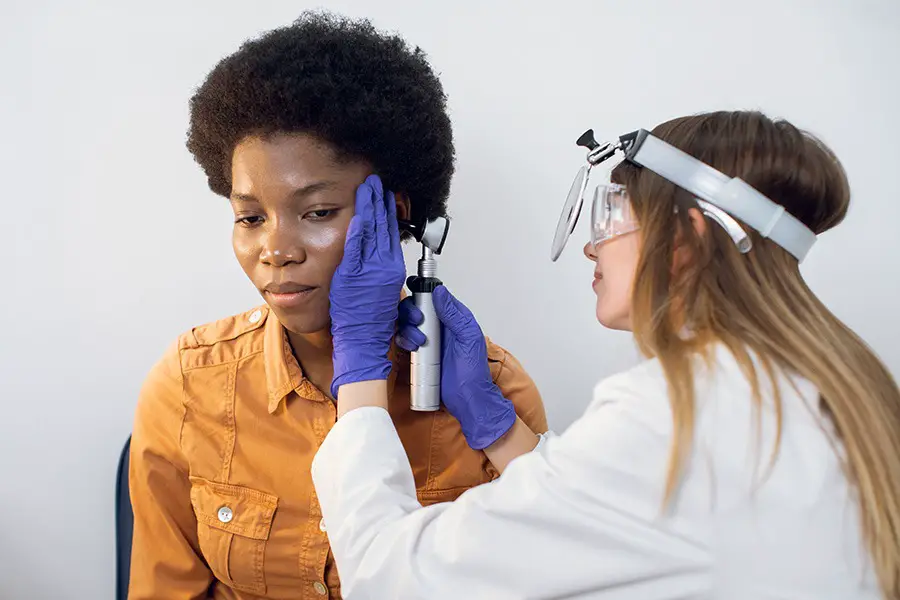Introduction
Sensorineural hearing loss (SNHL) is a pervasive auditory disorder that impacts countless individuals globally. It typically heralds a tornado of physiological alterations, psychological repercussions, and adjustments in everyday routines and interactions. Yet, the examination of SNHL is not confined to its medical aspects. Its deep impact on an individual’s emotional landscape, lifestyle, and interpersonal relationships presents an intriguing avenue for exploration deserving careful scrutiny.
In this analytical discourse, we probe into the diverse implications of SNHL, drawing from personal narratives, probing the emotional aftermath, associating SNHL with quality of life, and exploring a range of coping mechanisms. We also academically investigate the role of support networks, the hurdles encountered in professional settings, and the subtle effects on familial dynamics, providing a comprehensive perspective of the intricate tapestry woven by SNHL.
Our investigative endeavor seeks to offer readers an academic and compassionate understanding of the labyrinthine journey that SNHL often denotes. This undertaking involves a thorough dive into both statistical data and human narratives, as together they lay the groundwork for a holistic understanding of living with SNHL.
Living with Sensorineural Hearing Loss – Personal Stories
Personal tales offer a glimpse into the actual experiences of those living with sensorineural hearing loss. These accounts encapsulate the journey of diagnosis, acceptance of the condition, adaptation to new realities, and resilience demonstrated in the face of adversity. For instance, consider James, a music instructor who began to perceive changes in his auditory capabilities when he could no longer distinguish the subtle tonal variations of piano notes. Or Susan, a mother of two, grappling with her inability to hear her children’s laughter or the intricacies of their voices.
These narratives showcase the broad range of experiences with SNHL, demonstrating that the impact of the condition significantly varies across individuals. Many, like James and Susan, initially encounter feelings of loss, exasperation, and isolation. Nevertheless, they also narrate their journey towards acceptance, their attempts to adapt, and their determination to prevent SNHL from ruling their lives. James, for instance, found comfort in teaching music theory and composition, whereas Susan confronted her challenge head-on, employing hearing aids and speech-reading to improve communication with her children. Their stories remind us that living with SNHL isn’t just about losing a sense but about discovering alternative ways to perceive the world.
Emotional Impact of Sensorineural Hearing Loss – A Deep Dive
The emotional aftermath of sensorineural hearing loss is profound, extending its reach into various aspects of an individual’s existence. For many, SNHL can ignite feelings of exasperation, sorrow, rage, and occasionally, an intense sense of loss. Studies suggest that individuals with SNHL are more prone to emotional distress and have a higher incidence of anxiety and depression than their peers.
However, the emotional fallout of SNHL isn’t static or unidimensional. It’s an evolving narrative that gradually changes over time, influenced by factors such as the individual’s resilience, support network, accessibility to hearing aids, and coping mechanisms. Research indicates that emotional well-being improves over time for many living with SNHL, particularly those who actively seek support and utilize assistive devices. Therefore, while the emotional toll of SNHL is significant, it isn’t a constant reality, offering a ray of hope amid the challenges.
Audien BTE (Behind the Ear) Rechargeable OTC Hearing Aid
Experience Unparalleled Sound Quality with the New Audien BTE (Behind the Ear) hearing amplifier. Elevate your hearing with the clearest, highest-quality sound available in an over-the-counter hearing assistance device. Designed by Audien, renowned for their sleek and comfortable hearing devices, the BTE model ensures exceptional hearing performance. It features advanced digital technology, including four environmental modes, background noise reduction, feedback cancellation, and two directional microphones per unit (four in total).
Say Goodbye to Missed Conversations and Hello to Superior Sound. Audien hearing devices excel at amplifying speech while reducing background noise, allowing you to effortlessly engage in conversations with friends and family. Experience the consistent, long-lasting, and sharp sound quality without any whistling or feedback issues. With customizable volume control, you can easily adjust the amplification to meet your individual needs. These devices are perfect for enhancing high tones and improving TV dialogue clarity.
Rechargeable for Uninterrupted Use. The Audien BTE hearing amplifiers are 100% rechargeable, offering convenience and freedom from the hassle of tiny button batteries. With wireless magnetic charging technology, you can enjoy a 20-hour battery life with just a quick two-hour charging time. The included charging case provides up to three full charges, giving you a total of 60 hours of amplified sound. Simply place the devices in the case, and they will wirelessly charge, ensuring you’re always ready to hear your best. Experience the ease and reliability of Audien sound amplifiers, ideal for individuals with dexterity issues or those tired of constantly purchasing and replacing batteries.
Sensorineural Hearing Loss and Quality of Life – The Undeniable Link
Sensorineural hearing loss (SNHL) doesn’t merely impact auditory perception; it significantly shapes the overall quality of life of those affected. This link is validated by a multitude of studies indicating a reduction in life satisfaction, elevated stress levels, and decreased social activity participation among individuals with SNHL.
Moreover, the influence of SNHL on quality of life isn’t limited to those directly affected. It has a domino effect on family members, friends, and caregivers, altering their lifestyle, communication patterns, and emotional state. The transformative implications of SNHL on individuals’ lives underscore the need for all-encompassing management strategies. These should not merely include hearing aids and medical interventions, but also psychological support and lifestyle modifications.
QUIZ - TREATMENTS OF HEARING LOSS IN CHILDREN
Adapting to Life with Sensorineural Hearing Loss – Coping Strategies
Life with SNHL necessitates significant adaptation and the development of coping strategies. These strategies can range from using assistive listening devices and learning lip-reading, to seeking professional guidance from audiologists and psychologists, to making lifestyle adjustments. For example, many individuals with SNHL prefer to position themselves strategically during gatherings to facilitate better understanding of conversations or reduce background noise.
Another useful strategy is the adoption of self-advocacy. By better understanding their condition, individuals with SNHL can express their needs to family, friends, and coworkers, nurturing an atmosphere of empathy and support. Moreover, resilience and a positive mindset significantly contribute to better coping with SNHL. Together, these strategies underline that living with SNHL is not just about managing hearing loss but also about orchestrating a fulfilling and meaningful life amid the challenges.
The Role of Support Groups in Managing Sensorineural Hearing Loss
Support groups offer an invaluable resource in managing SNHL. They provide a platform for individuals to share their experiences, voice their frustrations, learn coping strategies, and, most importantly, understand that they are not alone in their journey. The shared experiences within these groups often create a sense of belonging, mitigating feelings of isolation and stigma associated with SNHL.
Moreover, the collective wisdom and experiential knowledge within these groups often serve as an invaluable resource for new members grappling with their diagnosis. Thus, the role of support groups extends beyond providing emotional solace. They also serve as a hub for practical tips, medical information, and invaluable advice. They stand as a testament to the power of shared experiences and collective resilience in navigating the journey of SNHL.
Employment Challenges for Individuals with Sensorineural Hearing Loss
Navigating the professional landscape with sensorineural hearing loss presents unique challenges. Individuals often encounter barriers related to communication, discrimination, and restricted job opportunities. Communication challenges can emerge due to background noise, group conversations, or meetings, especially in roles that require constant interpersonal interactions.
Furthermore, despite legislation preventing discrimination against individuals with disabilities, subtle biases may exist, leading to disparities in hiring, promotions, and compensation. While these challenges may seem daunting, they aren’t insurmountable. Many organizations are increasingly recognizing the importance of inclusivity and offering accommodations such as flexible work schedules, assistive technologies, and awareness training to their employees.
How Sensorineural Hearing Loss Affects Family Dynamics
The impact of sensorineural hearing loss isn’t confined to the individual diagnosed with the condition; it also extends to their family. Family dynamics can be significantly influenced by a member’s SNHL. Communication styles may need to adapt, roles may shift, and emotions can run high, especially during the initial adjustment period.
However, these changes can also foster empathy, resilience, and tighter bonds within the family. For instance, children of parents with SNHL often develop exceptional emotional sensitivity and adeptness at non-verbal communication. Spouses and partners can find new avenues of connection that aren’t dependent on verbal communication. Despite the initial challenges, families often find a way to redefine their dynamics that accommodates and respects the experiences of their member with SNHL.
Conclusion
Our analysis has demonstrated that sensorineural hearing loss spins a complex narrative extending beyond mere auditory perception. The disorder touches every aspect of life, requiring adaptation, resilience, and a transformative perspective from the affected individuals and their support networks.
The emotional repercussions are substantial, as are the influences on quality of life. Amid the challenges, individuals devise ingenious coping strategies, evolve, and prosper, often drawing strength from the support of others battling similar experiences. Difficulties in professional settings and altered family dynamics further highlight the far-reaching effects of SNHL.
However, by delving into the challenges, we also uncover the extraordinary resilience displayed by individuals in adversity. Their narratives remind us that while SNHL constitutes a significant part of their lives, it does not define them. Their spirit, strength, and constant adaptation reflect their identity, portraying a picture of resilience and adaptability in the face of SNHL.
This examination emphasizes the need for a comprehensive approach to managing SNHL, addressing the medical, psychological, and socio-cultural facets of the disorder. As we advance, it is imperative to continue these multifaceted explorations, promoting a holistic understanding of SNHL that can guide research, policy development, and the provision of care and support for the millions navigating their lives with SNHL.

Decoding Silence: An Analytical View on the Advances in Conductive Hearing Loss Research and Treatment
This analytical article sheds light on conductive hearing loss, offering an in-depth exploration of its genetic factors, treatment advances, and promising experimental therapies.

Embracing the Melody of Life: Navigating the Journey with Conductive Hearing Loss
A blog post delving into the experiences and challenges of living with conductive hearing loss, discussing its impact on everyday life, social interactions, mental health, and the potential benefits of hearing aids and cochlear implants.





